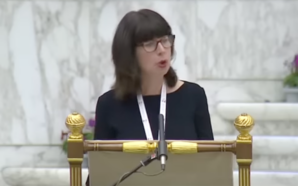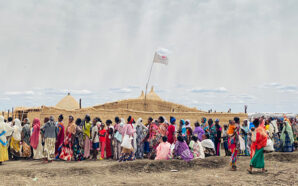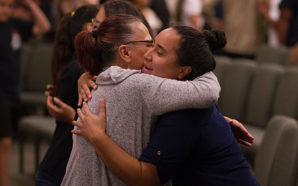Homily for the Twelfth Sunday in Ordinary Time Year A 2020
Readings: Jer 20:10-13; Rom 5:12-15; Matthew 10:26-33
21 June 2020
In the Church’s liturgical calendar, we now return to the Sundays in Ordinary Time. We haven’t celebrated a Sunday in ordinary time since 23 February 2020. Since then we have been taken up with Lent, Easter, the Ascension, the Trinity, Pentecost and Corpus Christi. Now we are back to the Ordinary Sundays. Today is the 12th Sunday in Ordinary Time, and for the first time in months, restrictions are being lifted, including some of the restrictions on public worship. Since 23 February, we have been taken up with many quite extraordinary things including the COVID-19 Pandemic and the response to Black Lives Matter. Perhaps we might find fresh blessing and hope in returning to Ordinary Time, hoping that indeed we might start getting back to ordinary times, able to live ordinary lives.
LISTEN: https://soundcloud.com/frank-brennan-6/homily-21620
This past week we have been marking Refugee Week with the theme: ‘celebrating the year of welcome’. This theme was obviously designed by a well-intentioned international committee well ahead of the pandemic and the all but universal shutting down of borders. Yesterday was World Refugee Day. During Refugee Week the US Supreme Court struck down President Trump’s attempt to shut down an immigration relief program known as Deferred Action for Childhood Arrivals (DACA), which allows certain unauthorised aliens who arrived in the United States as children to apply for a two-year forbearance of removal. The strongest judgment was delivered by Justice Sotomayor the only Hispanic and Latina judge on the court. While the other Justices turned a blind eye to the statements made by Donald Trump against Mexican immigrants both before and after his election, Justice Sotomayor took great exception to his declarations that Mexican immigrants are ‘people that have lots of problems,’ ‘the bad ones,’ and ‘criminals, drug dealers, [and] rapists.’ Trump has compared undocumented immigrants to ‘animals’ responsible for ‘the drugs, the gangs, the cartels, the crisis of smuggling and trafficking’. Sotomayor observed that her fellow Justices had simply brushed aside these statements as being ‘unilluminating,’ ‘remote in time,’ and having been ‘made in unrelated contexts.’ Taken together she thought that ‘the words of the President’ help to ‘create the strong perception’ that the recission decision was ‘contaminated by impermissible discriminatory animus’.
I daresay being of Hispanic and Latina descent helps even a Supreme Court judge detect the real significance of these sorts of statements emanating from government. In a time of pandemic, it is even easier for those of us assured our place of belonging in countries like the US and Australia to turn a blind eye to the refugee and the asylum seeker on the other side of the border, not to see the world from their side of the border, and not to hear the piercing words of those with power from the perspective of those being pierced.
Eight years ago addressing the Asia Society, ex-Prime Minister Paul Keating who first instituted the Australian policy of mandatory detention of unvisaed asylum seekers arriving by boat said: ‘I often used to say as prime minister, when they were handing out continents, not many people got one, but we did and there’s only 20 million of us. And yet we’re complaining about 6000 people coming by boat and we want to push all of them away.’
Here we are now a nation of 25 million people with secure borders and with no asylum seekers arriving by boat. At the end of March, our government was holding 1373 people in immigration detention. They are being held for an average of 545 days – ‘the longest average length of time in detention since the Government began publishing this information more than 10 years ago’. During Refugee Week, our Refugee Council pointed out: ‘The 1373 people include 512 who came by boat to seek asylum and 46 stateless people. Among them are many people designated as refugees in PNG and Nauru. Their detention is a clear breach of the Refugee Convention, which Australia signed in 1954, but there is nothing in Australian law to protect refugees from this breach of international law.’
In today’s gospel, Jesus says: ‘Are not two sparrows sold for a small coin? Yet not one of them falls to the ground without your Father’s knowledge. Even all the hairs of your head are counted. So do not be afraid; you are worth more than many sparrows.’ Justice Sotomayor on the US Supreme Court probably has some idea of how those words of Jesus sound to Hispanics and Latinas who have fled to the United States seeking asylum or the basics of a safe life. Those 1373 people being held in our Australian immigration detention facilities for an average of 18 months without trial or a court order must wonder whether indeed they are worth more than many sparrows in the eyes of decent Australians or in the eyes of Jesus, the saviour of the world. If they are not valued by Jesus’ followers, what hope would they ever have of thinking that they are so valued by Jesus, and what worth would that value be?
If you are like me, you have probably put the plight of refugees and asylum seekers ‘on hold’ during the course of the pandemic, quietly breathing a sigh of relief that the boats have stopped coming (even if you oppose Mr Dutton), and hoping that the situation might stay that way until the country gets back on its feet. We Australians, both in times of pandemic and in Ordinary Time, need to do more, paying our fair dividend to the world’s millions of refugees and internally displaced people who will never reach, let alone breach, our secure borders and who will never be eligible for admission under our highly regulated immigration policy. We need to pay our dues for enjoying the benefit of being an island nation continent, knowing that ‘when they were handing out continents, not many people got one, but we did and there’s only 25 million of us’.
Reflecting on the plight of refugees and asylum seekers in a time of border lockdowns and pandemic, Pope Francis has said: ‘This is not a time for self-centredness, because the challenge we are facing is shared by all, without distinguishing between persons. To preserve our common home and make it conform more and more to God’s original plan, we must commit ourselves to ensuring international cooperation, global solidarity and local commitment, leaving no one excluded.’
These are not popular sentiments. Anyone putting their head above the parapet and uttering such sentiments too publicly is likely to suffer the same fate as the prophet Jeremiah who says in today’s first reading: ‘I hear the whisperings of many: “Terror on every side! Denounce! let us denounce him!” All those who were my friends are on the watch for any misstep of mine. “Perhaps he will be trapped; then we can prevail, and take our vengeance on him.”’
We have driven ourselves into recession by sealing our borders and looking after those in our own community who are missing out on so much. How could we possibly be expected to do more, ensuring that no one is excluded even if they are well beyond our shores? How could we be even more universal in extending security to those who are not our primary national responsibility but who are slipping between the cracks of international protection? Anything more than we are presently doing is not only unachievable. It seems unimaginable. And yet Jesus tells us: ‘Do not be afraid. What I say to you in the darkness, speak in the light; what you hear whispered, proclaim on the housetops.’
Whenever he gets into a difficult bind or theological pickle about how to respond to vast incomprehensible moral quandaries, Pope Francis is fond of invoking St Joseph. So let’s join him in this prayer at the end of Refugee Week on this Sunday when we return to Ordinary Time hoping that in the ordinary things of life we may help even the most marginalised appreciate that they are worth more than many sparrows:
Father, you entrusted to Saint Joseph what you held most precious: the child Jesus and his Mother, in order to protect them from the dangers and threats of the wicked.
Grant that we may experience his protection and help. May he, who shared in the sufferings of those who flee from the hatred of the powerful, console and protect all our brothers and sisters driven by war, poverty and necessity to leave their homes and their lands to set out as refugees for safer places.
Help them, through the intercession of Saint Joseph, to find the strength to persevere, give them comfort in sorrows and courage amid their trials.
Grant to those who welcome them some of the tender love of this just and wise father, who loved Jesus as a true son and sustained Mary at every step of the way.
May he, who earned his bread by the work of his hands, watch over those who have seen everything in life taken away and obtain for them the dignity of a job and the serenity of a home.
We ask this through Jesus Christ, your Son, whom Saint Joseph saved by fleeing to Egypt, and trusting in the intercession of the Virgin Mary, whom he loved as a faithful husband in accordance with your will. Amen.
Fr Frank Brennan SJ is the Rector of Newman College, Melbourne and the former CEO of Catholic Social Services Australia (CSSA).








